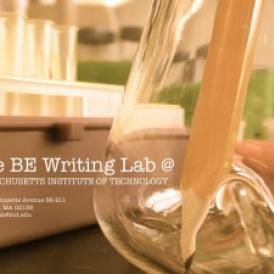
Since its opening this spring, the BE Writing Lab has completed 236 coaching sessions totaling over 213 hours of individualized academic support. While it was a successful first term for the BE Writing Lab, Jaime Goldstein, the lab’s leader and BE’s Writing Initiative Coordinator, feels “there is much work to be done integrating this great resource into the department’s authentic writing experiences if it is to have a lasting and deep impact.”
Launched in March 2013, the BE Writing Lab was created to improve students’ communication skills. It became clear, from the department’s exit survey results, that BE students yearned for more guidance with their writing and speaking; 47% of our graduating seniors reported that they didn’t feel that their communication skills had improved during their four years at MIT.
In an effort to change these statistics and improve the student experience, Professor Eric Alm and Instructor Agi Stachowiak formed a task force last year and soon hired Jaime Goldstein to join the team. After much research, the group decided to create an IAP course in advanced communications for biological engineers and to open a BE Writing Lab for individualized peer coaching.
Unlike MIT’s Writing Center, the BE Writing Lab was designed to be for scientists, by scientists; the Lab is staffed by the department’s top student writers, editors and coaches, the BE Writing Fellows. This first group of Fellows, who will serve until winter 2014, includes one undergraduate student (Byran Mejia-Sosa), eight graduate students (Alison Takemura, Christina Birch, Diana Chien, Jen Wilson, John Casey, Sarah Spencer, Scott Olesen and Tony Kulesa) and one post-doc (Carissa Young).
The BE Writing Fellows were trained rigorously to have thoughtful high-level conversations with students about their writing. Their focus has been on structure, organization and tone, not line-editing or grammar. This engaging strategy has been a powerful teaching tool as Emily Lydon, as a student in 20.109, wrote in a reflection about her experience working with the BE Writing Fellows: “[The Writing Fellow] asked me questions about [my] introduction as he read, which made me realize which areas needed more clarification and explanation. It was very helpful to have an outside reader who was knowledgeable in biological engineering but also not very familiar with our project. I definitely plan on meeting with [another] Writing Fellow again in the future.”
Dr. Stachowiak and Professor Alm, the instructors for 20.109 and 20.111 respectively, strongly encouraged students in their classes to come to the BE Writing Lab for coaching by offering extensions for students who sought help. A little over two-thirds of the students in 20.109 took advantage of the Writing Lab this semester and the faculty noted a significant difference in students’ writing. Professor Alan Jasanoff shared: “the students’ papers were significantly improved over previous years. Basics of writing style were much more apparent in their work, and the scientific content was thus more clearly expressed.”
One of the best indicators that the BE Writing Lab and Fellows are heading in the right direction is the fact that 75% (177 of the 236 visits) have been from repeat students – some “clients” have come to the Lab up to nine times for support suggesting that they are building longer-term relationships with individual Fellows and that they are finding the resource to be extremely helpful.
Another great sign that the Writing Lab is building a strong reputation is that several programs have asked to collaborate; the BE Writing Lab has now supported students in the EBICS REU summer program and the Amgen Scholars program with poster best practices workshops and individualized support. The Writing Lab will be collaborating with MIT’s Laureates & Leaders program this fall and will also be supporting BE courses 20.109, 20.110, 20.416 and 20.445. The Writing Lab will be partnering with BATS this year to help graduate students prepare for their presentations, and the Lab will also help speakers gear up for the BE Retreat in October. In addition to offering one-on-one coaching for students in those programs and courses, the BE Writing Fellows will be giving targeted interactive talks on best practices such as the CV and cover letter workshop that will be co-sponsored by the undergraduate academic office to help students prepare for fall recruiting and networking events.
One of the most significant writing experiences in the department is the thesis and Goldstein hopes to alleviate student stress about this long-term project with a thesis support group for graduate students. “Writing a thesis can be an overwhelming and often isolated experience,” claims Goldstein. “I hope to give graduate students a chance to learn strategies on how to approach the writing process and to make connections with others who are in a similar stage with their work.” Post-doc Carissa Young will be helping to facilitate the “Thesis Writers Anonymous” group this year and recent graduate Sean Clarke will assist while he is still on campus.
The Writing Lab and its Fellows are proud of this first semester and are eager to see what the future has in store. “Much like BE itself, the BE Writing Lab is young and initiative; we are working hard to evolve quickly and dynamically to help students and faculty achieve their goals,” says Goldstein. The Lab has big dreams of becoming a leader in the field of scientific communication and Goldstein is excited to flex her entrepreneurial muscles to use teaching, technology and innovation to transform BE into a superlative model.
For more information on the BE Writing Lab, check out its new website at http://bewritinglab.mit.edu or contact Jaime Goldstein at jbgold@mit.edu.


